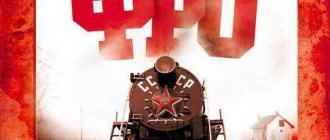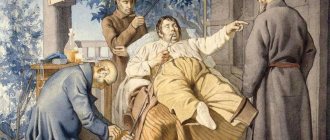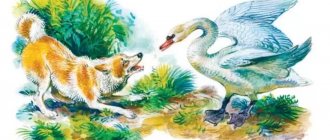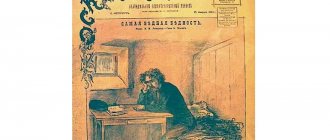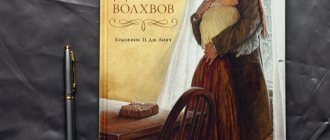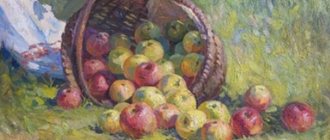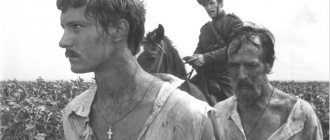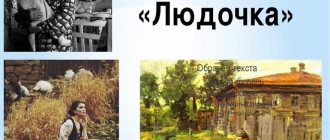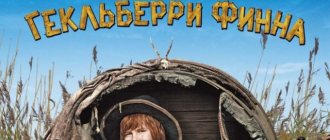History of creation and contents
The story was written by Vasily Makarovich Shukshin in 1970 and was then published in the seventh issue of the New World magazine. It was also included in the book of short stories “Characters,” published in 1973, and in the collection “Conversations under a Clear Moon.” The writer’s main idea was inspired by personal impressions from meetings and conversations with fellow villagers during short visits to his homeland in the village of Srostki, Altai Territory. The author considered “Cut” to be one of his favorite stories.
Main characters
As in any other work of this genre, there are few heroes here. Two main ones, between which there is a conflict, and the rest are minor:
- Gleb Kapustin is a local demagogue and debater, a sawmill worker.
- Konstantin Ivanovich Zhuravlev is a candidate of philological sciences, who left the village in his youth and moved to the city.
- Valentina is Zhuravlev’s wife.
- Agafya is his mother.
- Rural men.
Retrospectively, there is also a colonel present, also from this village.
Brief retelling
The middle son Kostya came from the city with his wife and schoolgirl daughter to old woman Agafya Zhuravleva in the small village of Novaya. They arrived to rest, visit, and brought gifts: an electric samovar, a colorful robe and wooden spoons. And news of this soon spread throughout the village.
It so happened that from this village, although small, many “notable” people came out: one colonel, two pilots, a doctor, a journalist. And since Konstantin Ivanovich was a candidate of philological sciences, he was also a scientist. It just so happened that when one of them visited his small homeland, a lot of people would crowd into his house to hear about city life and tell the local news themselves, if the visitor was interested in asking about it. But the main fun was considered to be “cutting off” the guest. Start a discussion with him, and bring him to everyone's ridicule.
There was a special person for this purpose - Gleb Kapustin - a strong man, well-read and malicious. Not a single “noble” could stand arguing with him. The colonel who looked into his father’s house was shaved off during the War of 1812. The military man could not remember the name of the count who ordered Moscow to be burned, he said - Rasputin, and they argued so much that he had to run to the teacher to find out. For six months afterwards, the men quoted Gleb as saying to his opponent: “Calm down, calm down, Comrade Colonel, you and I are not in Fili...”
And now, having waited for Kapustin from work in the evening, they informed him that the candidates had arrived (Zhuravlev’s wife also had a scientific degree), and went to visit. Gleb is ahead, and everyone else is behind him. This is how an experienced fist fighter is led when it becomes known that a certain new ruffian has appeared on a hostile street. But they themselves went as if to a performance, anticipating the pleasure of the upcoming humiliation of the city upstart.
Konstantin Ivanovich, not suspecting anything, was delighted with the guests, fussed, and invited them to the table. I recognized my fellow countrymen and asked questions. We remembered our childhood. Kapustin did not participate in the foreplay. He was originally from another village and until today he did not know Zhuravlev. He sat modestly and looked closely. Until I decided that it was time to ask the first question. And he organized it in this form: “How do you identify yourself?” The candidate had to translate it into Russian: “What do I do, or what?”
And although Konstantin Ivanovich worked at the philological faculty, Kapustin defined it as philosophical (he needed it that way) and arranged an exam consisting of questions, one more absurd than the other. He was interested in:
- What is more primary - matter or spirit?
- How does philosophy now define the concept of weightlessness, is there any confusion about this?
- How does the representative of science present here personally relate to the problem of shamanism in certain regions of the North?
- What if the Moon is a creation of the mind and how to contact alien inhabitants?
Gleb was not interested in answers. Each question asked with a twist was also accompanied by sarcastic comments, which is why Zhuravlev first laughed sincerely, then became confused and invited his wife to be present at the “strange conversation,” and there he lost his temper, which is exactly what his opponent needed. In every such dispute, there came a moment when Kapustin “soared up” above the visitor and unleashed an irresistible blow from a height. This happened now too. He was carried away.
He reminded visiting guests that candidacy is not a suit that you buy once and for all. That this suit needs to be cleaned, and his candidacy needs to be supported. Why show off by driving up in a taxi and unloading five suitcases from the trunk, impressive, but with a minus sign. And we need to be more modest and simpler. Don’t get carried away, otherwise it will be more painful to fall from a height. “Do you know what makes me special? I love to click on the nose. Don’t go above the waterline... You need to be more modest!”
And the candidate’s remarks and his wife’s question drown in this stream of words: “Why are we immodest?” The main thing is not an argument, but the ability to humiliate, insult and put the interlocutor in his place. “But you sit and think,” he says at parting and leaves everyone with a feeling of fulfilled duty. He leaves alone, and the men who separate later, even though they admire Kapustin’s abilities, still feel sorry for Kostya. You can hear the sympathy in their voices. Gleb amazed, surprised, but there was no love for him. Gleb is cruel, and no one has ever loved cruelty anywhere.
The next day he inquired about the condition of the candidates, and hearing that he had deftly shaved them yesterday, he remarked with a satisfied grin: “Nothing. This is useful. Let him think at his leisure. Otherwise they take on too much.”
Author's preliminary notes
Of course, acquaintance with the work in abbreviation does not create a unique atmosphere, which is achieved by the special intonation of the master. You need to read the entire story (fortunately, it is very short) to appreciate all the shades and nuances of the characters’ language, and the characteristics that the author succinctly gives them.
Vasily Makarovich himself left an interesting note in his drafts, made at the very initial stage of work on the work: “A learned man came to the village, a native of these places. Guests came to visit a fellow countryman. And one came to “talk.” And he spewed such scientific, bastard nonsense, so intricately... The scientist is confused, his fellow villagers listen with respect and horror to the idiot, who is not such an idiot after all.” Shukshin himself encountered similar things in his life. More than once he received letters from Srostki, in which former friends condemned him for the fact that he began to understand too much about himself.
The writer clearly looked at such attacks and saw behind them only shameless and evil revenge for the fact that someone managed to realize their talent in life, but such Kapustins did not.
Retelling briefly
Konstantin Ivanovich comes to his home village with his wife Valentina and their schoolgirl daughter to visit his mother and get some rest.
In the evening, men gather in the courtyard of his house, including local resident Gleb Kapustin, known for “cutting off” any educated intellectual in a conversation.
The owners of the house warmly welcome them and invite them to the table, but it immediately becomes clear that the conversation is going in the wrong direction. Kapustin, not allowing Konstantin Ivanovich to come to his senses, asks him question after question under the approving glances of the men. He is allegedly interested in questions of philosophy, the primacy of matter, and the problems of modern shamanism.
Zhuravlev, lost from Gleb’s absurd phrases and his ignorance, cannot understand what answers are expected from him. At the end of the performance, Kapustin invites the candidate and his wife to be more modest and think about his words.
Rural men respected Gleb Kapustin for his ability to cut off any opponent
With these words, the company of village men heads for the exit, feeling their superiority over the city intellectuals, whom Gleb once again “cut off” in the conversation.
Reviews about the story
“Cut” immediately attracted the attention of the reading public and caused serious discussion in literary circles. Despite the clearly expressed author's position and the transparency of the situation, controversy developed both around the images of the main characters and about the very idea of the work. It got to the point that, in attempts to explain Gleb’s behavioral line, some critics, getting carried away, called him almost a spontaneous rebel, a defender of the village in front of the arrogance and arrogance of the city.
Participants in the conflict
But this approach is unlikely to be legitimate, because in the image of a candidate of sciences we see an intelligent, friendly person who has achieved success in life thanks to his intelligence and hard work. Throughout the entire dispute, Konstantin Ivanovich behaves adequately to the situation, tries to honestly understand what is happening, and there is no arrogance or snobbery in his behavior. His attitude towards others is respectful. And Zhuravlev loses the verbal battle only because he does not humiliate himself to retaliatory rudeness. His good manners do not even allow him to interrupt his interlocutor.
Kapustin is its complete opposite. This is a local truth-teller, arrogant, ill-mannered, and has no idea about behavior at a party and a sense of tact. He strives for one goal - to debunk the city smart guys, show them their real place, and at the same time assert himself in the eyes of his fellow villagers. And for this, all means are good. Having read popular literature, picked up superficial knowledge without deep understanding, Gleb sprinkles pseudoscientific maxims (about the problems of shamanism) and recommendations (how to establish a dialogue with aliens when they come).
For a serious person, this is a bunch of nonsense, but the men around Kapustin don’t think so at all. Little understanding of what they are talking about, they believe that since the visitor is silent, therefore, he has nothing to cover, and victory is on their side. And all of Gleb’s efforts are not aimed at “talking to an intelligent person,” which is how he begins his conversation, but only at making an impression on the local public, even if this means turning someone’s face into the dirt.
Villagers in the story
Men are another main character in the work, on whom the moral outcome of the confrontation depends. This is the organizer, the spectator, and the judge of the action that unfolds before the reader. In a broad sense, this is the image of a crowd opposing a positive hero. Coming from a rural environment himself , Shukshin knew very well both the good and bad sides of the peasant character . The truth of life, noticed by the writer, revealed the most serious social and moral problems of the village.
This is aggressive ignorance associated with a lack of normal education, which entails envy and rejection of other people's successes. Hence this whole performance, in which an innocent person is doomed in advance to become a victim, because he is simply unfamiliar with the rules by which the local game is played. The crowd, the gray mass, gladly rejects from itself all the best that it has produced, perceiving it as a foreign element.
The desire to put down and humiliate a successful and truly intelligent person is generally characteristic of undeveloped people. This way they receive a kind of compensation for their own personal inferiority. In fiction, this looks like a reproach to the entire system, which is unable to give a person the opportunity to receive a normal education and upbringing, to develop himself, and accustoms him only to mechanical agricultural labor.
Meaning of the name
In Ancient Greece, where the concepts of demos - people and ochlos - crowd were clearly opposed, there was a parable about the Milesian tyrant Thrasybulus. Demonstrating the principle of his rule to the ambassadors of the neighboring state, he went out into the wheat field and began to knock down the ears of corn that grew taller than others with a cane. The word “cut” in the title of the story has the same allusion. This is what the method of grain harvesting used to be called in the villages.
The main idea of the story
Even a brief summary of V. Shukshin’s work “Cut” allows the reader to see the main meaning that the author laid down. Vasily Makarovich wanted to show how envy and meanness destroy the best in a person. It is difficult for people like Kapustin to understand that it can be difficult to achieve something in life, and instead of striving for more, they assert themselves at the expense of those who are smarter, more educated, more intelligent, humiliating them. Shukshin ridicules the ignorance and unceremoniousness of such people in the story.
Meaning in creative writing
It is no coincidence that the author highly valued this work of his. It reflected with maximum force one of the fundamental principles of Russian literature - capacity and depth, when “words are cramped, but thoughts are spacious.” And critics of Shukshin’s “Cut”, despite all the contradictory opinions, always highly appreciated artistic skill and literary perfection, expressed in a form that was simple to the point of genius.
Images of weirdos
Vasily Makarovich created a whole gallery of wonderful folk portraits in his work. At the same time, he was attracted to people who were simple, poorly educated, but distinguished from everyone else by some kind of strangeness. According to the writer, it is in such unusual heroes that both positive and negative traits of the national character are most clearly manifested. He felt sympathy for most of his eccentric characters and described them with gentle humor and restrained tenderness . Conventionally, they can be divided into three groups:
- Naive. People like Chudik from the story of the same name, Sergei Dukhanin (“Boots”) are touchingly caring, deeply feeling people.
- Thinkers. Andrey Erin (“Microscope”), Monya Kvasov (“Stubborn”) - who are ready to make personal sacrifices for the sake of everyone’s well-being.
- Cruel and ignorant. Like Gleb Kapustin or Kolka Shurygin from the story “A Strong Man”.
Shukshin has a wonderful technique for marking his heroes. He never describes the emotional experiences of negative characters, as if they do not have them at all. While the heroes with whom he sympathizes are precisely busy searching for the meaning of life and beauty in their own souls.
Meaning of the name
By the word “cut,” the main character meant the ability to lower in the eyes of others an allegedly arrogant successful person who came from the city to boast of his achievements and career. Each time, Gleb Kapustin was invited by his fellow villagers to an evening with some important person, so that he, as an intelligent and well-read person, would explain that these citizens did not really understand anything.
The village truth teller was throwing dust in his eyes, expressing pseudo-clever maxims, such as, for example, “the problem of shamanism in the northern territories.” He read all this from newspapers, memorized it, but did not understand what was said in the articles. The erudite learned only the outward manifestation of learning. He explained his passion for throwing a guest into the mud this way: “I like to hit you on the nose - don’t go above the waterline! Be more modest, dear comrades...” That is, he himself did not see his impudence, but he readily noticed it in every visiting townsman. The meaning of the word “cut” in relation to the content of the story is revealed in the ordinary sense of the verb. In the village they cut off the ripe ears of corn. That’s why the neighbors called Kapustin’s behavior that way, referring to their daily experience of working in the fields.
Characteristics of Gleb Kapustin in the story “Cut” by Shukshin, image, description
| Seated peasant. Artist Paul Cézanne |
Gleb Kapustin is the main character of the famous story “Cut” by Vasily Shukshin.
The image and characteristics of Gleb Kapustin in the story “Cut” by Shukshin
“Gleb Kapustin was from a neighboring village and knew little of the local noble people.”
“Gleb came home from work (he worked at a sawmill). "
“And somehow he narrowed his annoying eyes vindictively.”
". Gleb Kapustin came and cut off the noble guest. Many were unhappy with this, but many, especially men, were simply waiting for Gleb Kapustin to cut off the noble.”
“Gleb Kapustin continued to invariably surprise. Amazed, even delighted.”
“There are candidates of technical sciences, there are general education students, these are mainly involved in trepalogy.”
“Darling, dog. How does he know so much about the Moon?”
“The old dog, combed poor Konstantin Ivanovich’s hair. A?"
“At least there was no love here. No, there was no love. Gleb is cruel, and no one has ever loved cruelty anywhere.”
“The candidate laughed sincerely.
But only one laughed. And I felt awkward. He called his wife:
- Valya, come, we’re here. some strange conversation!
“Tomorrow, when Gleb Kapustin comes to work, by the way (he will play), he will ask the men:
This is the quotation image and characterization of Gleb Kapustin in the story “Cut” by Shukshin: a description of the appearance and character of the character.
Source
From the history of writing a story
“Cut” is a symbolic work. It is no coincidence that Shukshin talks so much about the reforms carried out in the Soviet Union (electrification, etc.). The fact is that the year this literary masterpiece was created is 1970. Namely, this year Lenin’s anniversary was celebrated. And what a one! Centenary of the birth of Vladimir Ilyich.
Vasily Shukshin has gained a reputation as a master of short, laconic stories. The analyzed text is included in the collection of the Russian author entitled “Characters”. The work is distinguished by the uniqueness of its plot and the originality of its characters. The key problem of the story attracts special attention from critics and literary scholars. The writer, in particular, describes social dissatisfaction and reflects on the failure of people. Most of the heroes of the work are unsettled people, not self-sufficient.
About the genre specificity of the work
Vasily Shukshin had not only artistic talent, but also analytical skills. The writer, in particular, himself created a classification of types of works. According to this classification, “Cut” belongs to the category of “anecdote stories” and “character stories.” The anecdotal nature of the work is associated with the brevity, laconism of the plot, the external absurdity of what is happening, and the comic nature of the situations. The main events of the text take place in the evening, on the same day. The characters' dialogues are striking in their illogicality. This trait makes the dialogue funny. The reader is obviously in a comic mood, expecting funny situations. The characters that the writer brings out also cause laughter. What makes a text a “story-character” is the precision of its details. The author ruthlessly, clearly, and a little harshly portrays his heroes who participate in philosophical battles.
Theme and problems of the text
The analyzed work belongs to Shukshin’s late creations. During this period, the writer constantly raises in his work the problem of relations between the village and the metropolis. However, this social motive is only an outer shell that hides the philosophical depth of the story.
Vasily Shukshin entered the history of Russian literature with his colorful, lively works. One of them is “Weird”, which is called a story-fate. We invite readers to read the description of this story
The philosophical (or rather philosophical-anthropological) side of the work lies in reflections on disunity. The people in Shukshin’s view are by no means an integral unit. People live in alienation, misunderstanding, and do not want to listen and hear each other.
Stylistic and artistic features of the work
Shukshin turns to Chekhov’s technique of “dialogue of the deaf.” This is the key artistic detail of the work. The writer focuses on the importance of verbal portraits. Candidates of science outside universities use simple, tired, empty words. On the contrary, a sawmill worker, a simpleton from the people, “cuts” “scientific” people with scientific terms and an original style.
The text is objectively concise. Capacious, sharp, sharp details are striking, with which the author literally blows readers away.
Key plot points
Arrival of guests
The writer begins the story with a story about an Altai village. An old woman, Agafya Zhuravleva, lives in a remote village. A woman receives Moscow guests: the “rich scientist” Konstantin Ivanovich, his wife and schoolgirl daughter. This event is described as very important for the village. The author places special emphasis on this.
The image of Muscovites
The wife of the “rich scientist” was called Valya. The author presents the heroine as a native resident of Moscow, the largest city in Russia. The inhabitants of the metropolis were given gifts that the guests brought to the village. In addition to the electric samovar, a multi-colored robe, there were also wooden cutlery. Electrical appliances are a nod to the ubiquity of electrification. In particular, Andrei Platonov wrote about Lenin’s idea to electrify the entire country. The author noted the pros, cons and real consequences of electrification. Shukshin thus shows that Altai is also supplied with electricity.
Misunderstanding between people
The writer skillfully uses gifts to demonstrate the degree of misunderstanding between people. A “real” samovar, the water in which is heated using a mini-fire made of pine cones, tastes better. A multi-colored robe is not the most original thing, because it is sold in almost all rural stores. In Moscow, of course, “ethno” cutlery looks exotic and fashionable. But in Altai villages such things are more likely to be accepted politely, but without understanding - at best. In the worst case, the people will contemptuously reject the gifts from Muscovites.
City residents are described as being far removed from rural life. Muscovites apparently believe that the village is almost medieval. Although wooden spoons have long been out of use here, people eat with ordinary metal cutlery. Konstantin, now a Muscovite, is going to his mother. The hero himself comes from Altai, but does not think about the uselessness and absurdity of his gifts. The “retinue” of guests is as many as five suitcases. But the mother is waiting for her son, not gifts, so the woman does not care what is in these suitcases.
Mother and son relationship
The text does not say directly, but the plot of the story makes it clear: Konstantin did not visit his mother for a very long time. Perhaps a full decade has passed since the last visit. Life in the metropolis pulled the hero into its endless and bright whirlpool. Kostya’s mother felt like a grandmother for the first time: the woman saw her granddaughter for the first time.
Konstantin shows himself not to be the most reliable and grateful son. This fact becomes obvious - both to readers and to characters. Kostya's family belongs to the category of "nobles". The writer makes a short excursion into the history of the village (which, by the way, is called Novaya). The village is small, but it gave birth to many “notable” people (that is, the intelligentsia).
The story of Gleb Kapustin
Among the villagers, the author mentions a certain Gleb Kapustin. No one in the village liked this man. Moreover, Kapustin even aroused fears among people around him, and especially among intellectuals. Why? The fact is that Gleb had a habit of “coming and cutting off noble guests.” It is not for nothing that the word “cut off” was used (“Cut off” the author made the title of his work).
The author tells how the hero “cut down” one “noble” man, a colonel. The reason was that the colonel distorted the name of the count, on whose orders Moscow was burned in 1812. Critics joke that Shukshin is testing the erudition of his audience. The writer never gives the correct name of that count (Rostopchin). Well, the colonel “called” the count Rasputin. This part of the work is an anecdote: Rasputin is a famous personality during the reign of Nicholas II. Readers who know about Rasputin will probably laugh at this story. In addition, the writer mocks the colonel who does not know military history - his area of competence.
Constantine's mistake
The events taking place in the village do not concern Konstantin. The hero was completely drawn into Moscow life. The man came not so much to visit his mother as to show his wealth and well-being. Constantine's goal is to show off. The hero's behavior further widens the gap of misunderstanding between the villagers and the city dwellers.
As a result, Konstantin is fatally mistaken. The hero ignores Kapustin and does not pay tribute to the interest that Gleb shows. This moment becomes the basis of the plot anecdote.
Kapustin demonstratively shows contempt for terms and abstruse words. And yet the hero is not stupid. Gleb understands that Muscovites are philologists, not philosophers. Therefore, a dispute about philosophical matters looks comical and absurd. The writer, in the form of an anecdote, reveals the absurdity of some provisions of dialectical materialism. Kostya and his wife do not pass the test of the dispute, suffering a shameful defeat. Kapustin, an ordinary worker who works from morning to night at the sawmill, knows more about diamat than the “noble” people from the city.
Philosophical debate as an anecdote
So, Kapustin starts a philosophical argument with the Zhuravlev couple. The purpose of this dispute is not at all to clarify the truth. Gleb likes to “click” scientists on the noses. Thus, according to the hero, he knocks the crowns off the heads of “noble” individuals. Kapustin, of course, wins the argument solely by speculation. But objectively, Gleb is wrong. In the hero's arguments, both form and content suffer. Kapustin rather insults and subtly accuses Konstantin than rationally proves his point of view. Ideas, like common sense thoughts, are absent from Kapustin’s speech.
In addition, Kapustin behaves indecently because he is rude to people when he comes to visit them. However, Gleb’s words contain a lot of everyday experience. There is enough common sense in the position that Kapustin takes. The hero seems to bring intellectuals, “noble” people to clean water. On the one hand, “scientific” people actually make discoveries, create new products, invent useful things, and write books. On the other hand, intellectuals often use words about the welfare of the people. At the same time, the “pundits” forget about the real state of affairs in the villages. The reality of rural life lies in hard daily work, mundaneness, and distance from high matters.
Symbolism of names
Shukshin gives his characters “talking”, symbolic surnames. The Zhuravlev couple puts themselves above other people. The couple “soared” among the social elite like pie in the sky. Kapustin, on the other hand, remained at the level of the vegetable garden, cabbage. However, the author seems to be asking a question between the lines: how fair is this arrangement?
Text composition
Shukshin was famous for his passion for literary experiments. Most often these experiments concerned composition. In this work, the exposition does not come at the beginning of the text, but follows the plot. The exhibition, in particular, concerns the history of Gleb.
